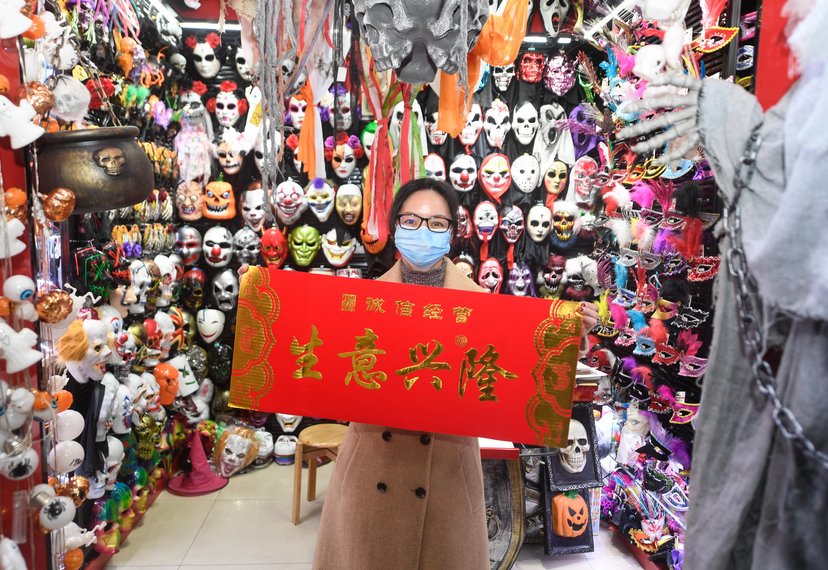HANGZHOU, Feb. 18 (Xinhua) -- Yiwu International Trade Market, the world's leading small commodities market in east China's Zhejiang Province, was reopened to customers from all around the world Tuesday morning.
The market usually opens on the 12th day of the first month on the Chinese lunar calendar after the Spring Festival holiday. However, the opening date was postponed for nearly two weeks this year for coronavirus epidemic prevention.
Purchasers and merchants have been assigned QR codes after submitting an online application. Purchasers should scan the codes of the merchants that they visit to record their tracks in the market.
These QR codes, along with face recognition technology and high-definition cameras, have been adopted to follow all personnel's tracks in the market.
As of 5 p.m. Sunday, applications of 54,679 merchants, employees and purchasers have been authorized online.
Catering, accommodation, foreign trade services, logistics, customs clearance, finance and other supporting services will also resume to ensure operations of the market go back to normal.
On Tuesday morning, with authorized QR codes and valid identity cards, merchants wearing masks entered the market after passing body temperature tests.
Zhang Xiaoai is one of the merchants. "Although online communication has become a main way of our communication with customers, the shops in the market are still important windows for displaying our products," Zhang said.
On Tuesday, an estimated 50 percent of merchants returned to business, and the share may rise to 80 percent by the end of this month, according to Zhang Qizhen, deputy general manager of Zhejiang China Commodities City Group.
Yiwu is home to the world's leading small commodities market. In 2019, there were more than 1.4 million non-natives and 15,000 overseas businesspeople in Yiwu.
PRECISE EPIDEMIC CONTROL
Going through the infrared temperature measurement channel with her QR code and passport, Mexican purchaser Veronica felt relieved.
"These procedures made me feel safe," she said.
Purchaser Handy from Yemen directly went to the crystal decoration area to check out the products.
"I have been looking forward to the opening every day, and I came here early in the morning," he said.
Because the market closed early but opened late, he had run out of storage. "I'm more anxious than the merchants," he said.
Zhang Qizhen also felt relieved when he saw merchants and purchasers entering the market one after another.
Thanks to Yiwu's precise epidemic control with smart technologies, the city is well prepared for every aspect of the market opening, said Zhang, deputy general manager of Zhejiang China Commodities City Group.
Production and work had been resuming in Yiwu under measures ensuring the prevention and control of the epidemic, said Yiwu's deputy mayor Ge Qiaodi at a press conference Saturday.
The market venues opened Tuesday with 16 entrances. Each entrance is equipped with intelligent equipment such as real-time infrared thermometers. The system automatically gives an alarm if someone's body temperature exceeds 37.3 degrees Celsius.
YIWU IS READY
A lot of Yiwu merchants have the habit to make storage in advance, allowing them to take orders and deliver goods before work resumes in factories and in the market.
As of 5 p.m. Sunday, major e-commerce business, foreign companies and industrial enterprises had seen at least 80 percent of their businesses returning to operations in Yiwu.
On Sunday alone, the number of packages reached 9 million in Yiwu. Even though some fast-delivery employees have not returned yet, the daily average orders in February has already surpassed that of the same period last year.
On Feb. 10, trains started transporting goods between Yiwu and countries and regions across Eurasia. In 2019, Yiwu launched 528 China-Europe freight trains carrying over 42,286 standard containers, up 65 percent and 68.7 percent year on year, respectively.
In order to contain the epidemic, the Yiwu government has decided to rent 40,000 beds from hotels for those who need quarantine after returning to work. The government will cover their living expenses. The government will also provide three-day free accommodations for people who are willing to find a job or start a business there.




 A single purchase
A single purchase









